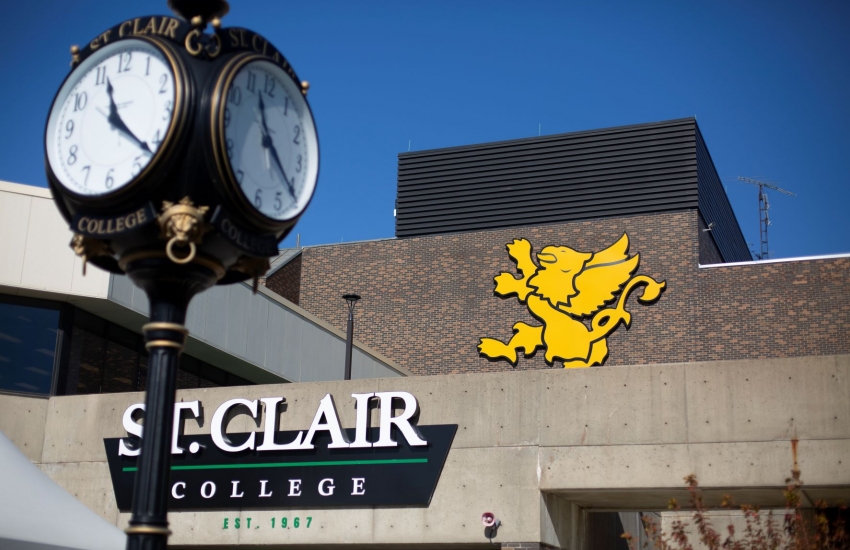
Two reports on early literacy have been released by a group of researchers from St. Clair College’s Research, Innovation and Entrepreneurship department in partnership with ProsperUs Cradle to Career strategy.
The first report, “Summary – Literacy in Windsor-Essex” – looks at early literacy challenges and theoretical understandings and gaps in vulnerable neighbourhoods. The group is specifically focusing its research on West Windsor, Downtown Windsor, and Leamington, where the data has shown literacy statistically lags provincial averages.
The research team, lead by Beckie Berlasty, is comprised of professors from St. Clair College’s School of Community Studies, including Dr. Kathryn Markham-Petro and Danielle Koresky from the Early Childhood Education (ECE) Department, as well as Instructor Alexandra Frabotta.
The researchers examined Early Development Instrument (EDI) data, Education Quality and Accountability Office (EQAO) scores, as well as the communities’ access to literacy resources. They conducted focus groups to gauge barriers parents and children experience to access literacy sources and they met with community leaders.
A companion report entitled “Community Profiles of West Windsor, Downtown and Leamington” will be used to understand the resources, community demographics and cultural landscape of the target neighbourhoods to formulate strategic plans for literacy improvement.
The researchers found that a larger percentage of children in Windsor-Essex were considered ‘at-risk’ in the language and cognitive development Early Development Instrument (EDI) domain, when compared to provincial averages. “Windsor-Essex children are falling behind in their literacy development and are therefore at risk of a number of adverse outcomes associated with reading failure, such as academic and social issues, low self-esteem and lacking motivation,” the report states.
The researchers hope to address child literacy concerns in Windsor-Essex County by developing interventions to remove neighbourhood-specific barriers to children achieving key developmental milestones, using a wrap-around approach.
The grant for the research comes from the Natural Sciences and Engineering Research Council of Canada’s College and Community Social Innovation Fund, which was awarded to St. Clair College in Spring of 2020.
Berlasty said the researchers hope their work will benefit the community in planning future projects, those related to literacy as well as those that address interrelated community needs.
“The ultimate goal is to understand barriers these communities are facing, and to improve overall system coordination as it pertains to literacy,” Berlasty said. “Literacy is critical to children’s overall development and educational success. The hope is to reach children earlier so they can be more successful later on.”
From this review, recommendations for interventions and supports within these communities are made as well as insights for further research. Some of these recommendations include increasing accessibility of programs and services, facilitating greater coordination of existing services, focusing efforts on sustainability, increasing resident’s involvement in community planning, as well as addressing other intersecting factors affecting educational success correlated to poverty.
“St. Clair College is proud to support this research in the area of early literacy,” said President Patti France. “The first step toward eliminating barriers that prevent children from accessing the tools they require in their first few years of life is to understand what they are. Through these collective partnerships, we can build communities that enable children to achieve their full potential.”
The partnership between St. Clair College and ProsperUs supports Milestone 1 in the Cradle to Career strategy -- ensuring children are kindergarten-ready – through a literacy lens. The two reports are part of the first phase of the overall project, which outlines barriers to literacy at the local level. They characterize the existing literacy landscape and identify opportunities for development in the ProsperUs priority neighbourhoods. Literacy-centred interventions will then be implemented based on the community’s needs and successful evidence-based literacy models.
“The success of the cradle to career strategy relies on meaningful data and feedback from residents and service providers in order to make informed decisions,” says Lorraine Goddard, CEO, United Way/Centraide Windsor-Essex County. “By working differently together, we’re learning more about the barriers that exist in specific neighbourhoods, and how we can create solutions that better support children and families in this community,” she added.
In addition to St. Clair College’s ECE instructors and professors, the research team is comprised of student researchers from both the Early Childhood Education program, Honours Bachelor of Applied Arts in Social Justice & Legal Studies program, as well as Data Analytics. As the project enters year two, the researchers hope to provide more students with research experience and expand their reach in the community.
“We are so proud to be a part of this important work and will continue to support our Community Studies faculty and researchers in this exciting collaboration,” said Monica Staley Liang, Chair of Community Studies, St. Clair College.
“This is another example of how community partners are working differently, and collectively, to create more positive outcomes for children and youth in Windsor and Essex County,” says Jessica Sartori, Co-Chair, ProsperUs and CEO, John McGivney Children’s Centre.
“I applaud the efforts of St. Clair College to contribute to our understanding of what research gaps exist and how we can begin to address those gaps and help children succeed,” said Jim Inglis, Co-Chair, ProsperUs and Regional Vice-President, BMO.
To read these two reports and learn more about St. Clair College’s Research and Development efforts, please visit the St. Clair College’s Research, Innovation and Entrepreneurship website: https://www.stclaircollege.ca/applied-research/resources.
For direct access to the reports: